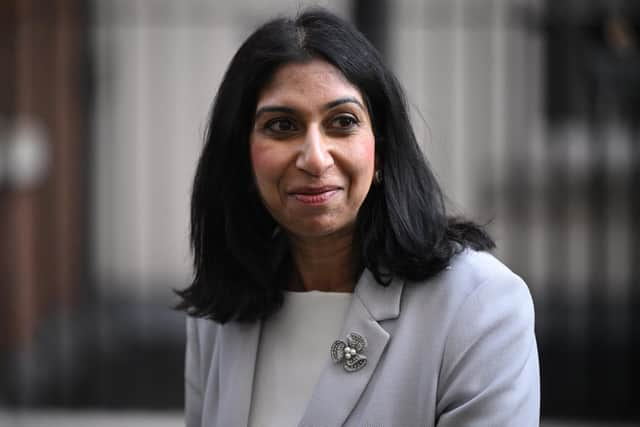Suella Braverman's alarming attack on human rights risks hurting us all: Jayne Dowle
I figured that the last thing her questionable views deserved were too much personal angst, or the oxygen of further publicity.
Until last week, when a speech to US think-tank in Washington stopped me in my tracks. In order to bring forward her plan to deport illegal immigrants to Rwanda – due to be heard in the Supreme Court in October – she’s considering withdrawing the UK from the European Convention on Human Rights (ECHR) in case the court in Strasbourg overrules and blocks the deportation flights.
Advertisement
Hide AdAdvertisement
Hide AdI’m sorry, but I can’t ignore her any longer. For as long as I can remember, the European Convention on Human Rights has been there. Although the institution has come in for some flak over the years - not least under Labour’s former Prime Minister, Tony Blair, who in 2006, called for a change in human rights legislation after claims that then-laws put the rights of criminals above those of victims - but for a British government, in the precarious world of 2023, to pull out would mark the start of a very slippery slope.


Britain incorporated the convention’s rights into domestic legislation through the 1998 Human Rights Act, but we’ve had protection since 1950. Forty-six countries in total are members. The only European countries that are not signatories are Russia, expelled following its invasion of Ukraine, and Belarus.
If Braverman is allowed to push forward with this, do we really want to be in this team? I’ve had a good look and I don’t remember leaving the ECHR being part of any party political manifesto or Brexit negotiations, but please do correct me if I’m wrong.
If you think that this move wouldn’t affect us, and would simply be something legislative that happens in the far-off halls of Strasbourg, think again.
Advertisement
Hide AdAdvertisement
Hide AdAs well as prohibiting collective deportation of foreigners, the convention prevents the death penalty, torture, inhuman or degrading treatment or punishment, slavery and forced labour.
It also protects the right to life, freedom, security, respect for private and family life, freedom of expression, freedom of thought, conscience and religion, to vote in and stand for election, a fair trial in civil and criminal matters and the right to property and peaceful enjoyment of possessions.
In other words, it underpins life as we know it. Leave and this could open the floodgates to the rights of individuals being over-ridden by the state. I am prepared to offer Braverman some benefit of the doubt; I can understand how, if she can see no other legal recourse, that pushing for a withdrawal would be the only way to allow deportations to Rwanda to happen.
But surely, she must realise that the government – and the British people – would be totally hoist on her own petard. The big question is, what would we lose – and what would we really gain?
Advertisement
Hide AdAdvertisement
Hide AdThe UK would become the first country to voluntarily withdraw from the ECHR mechanism. We would surely need a brand-new set of protections to be devised to ensure that our fundamental rights were still protected.
Not being a member would also undermine our standing in the world when it comes to challenging human rights abuses elsewhere; it would undermine our global credibility and leave us further isolated in a post-Brexit world.
Fellow Cabinet ministers are reported to be up in arms at Braverman going rogue like this. Speaking to reporters, one said that leaving the ECHR would “cause more problems than it would solve”, and another, rightly argued that “We should let it [the Supreme Court] hear the case without commentary from politicians. All the talk of leaving the convention is not helping the government’s case.”
So far, there is hardly a chorus of approval forming. Most British people, politicians or not, see that although they might not always agree with legal decisions – especially those decided upon on Continental shores – there are legislative protections there for a reason.
Advertisement
Hide AdAdvertisement
Hide AdThe Home Secretary might also like to take on board that she shouldn’t assume she has the wholehearted support of the British people behind her.
A majority of respondents in every region and nation in the UK want to stay in the convention, according to a poll carried out for Amnesty International UK by market research consultancy Savanta. This found that 57 per cent of those questioned said the UK should stay part of the ECHR, while 22 per cent sought withdrawal, with a further 21 per cent unsure.
The vast majority of all people surveyed, (92 per cent) said the next government should prioritise other issues over withdrawal from the convention. Perhaps the economy, and for voters in our region, HS2 surely, would take precedence? This ‘anti’ view was even shared wholeheartedly among Conservative voters at the last election, with more than 80 per cent saying that leaving the ECHR should not be a top-five priority.
What is she even thinking of then? Let us hope that the voices of reason prevail, because withdrawal could leave us with no voice at all.